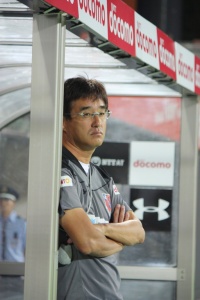It takes a special kind of team to set a record unbeaten run and club best (worst?) consecutive losing run in the same season. Was firing the coach the right call for Omiya Ardija though?
I interviewed Zdenko Verdenik after Omiya Ardija had beaten Cerezo Osaka 2-1 back in April and asked him tongue-in cheek if he thought Shin Kanazawa would ever be able to repeat his astonishing halfway line goal that had put them ahead inside the first minute of that game.
He laughed and said he very much doubted it, before adding a caveat: “In football anything can happen, nothing is strange.”
I’m not so sure. Kanazawa of course hasn’t managed to replicate his wonder strike, but if he had would it have been any more surprising than Verdenik’s unceremonious firing three weeks ago?
While rumours have swirled since to the contrary, for most of us looking in from the outside the sacking was totally unexpected and it is still hard to understand how a coach who had lifted the perennial relegation-battlers to the top of the table could be so mercilessly dismissed.
Yes, their fortunes had changed markedly since that first Cerezo game, and the loss to Yoichiro Kakitani and co. on August 10th was Ardija’s fifth in a row, but such bumps in the road have been ridden out before. Kashima Antlers lost five on the bounce en route to their 2009 J1 title, for example, while that same season Urawa Reds were defeated in seven straight games without Volker Finke being shown the door.
Verdenik wasn’t afforded such patience tough, and amid accusations of losing the dressing room and arguments with his coaches the Slovenian was disposed of.
Upon my return from England the first game I took in was Tsutomu Ogura’s debut in charge of Ardija – having previously served as a coach under Verdenik and, very briefly, as technical director – and it was clear that there is much that needs repairing at NACK5.
Not least of all there is the form, fitness and, let’s be honest, mood of star strikers Milivoje Novakovic and Zlatan Ljubijankic. The pair will obviously have been two of the most aggrieved at recent events, and just how much longer they will be in Saitama is hard to gauge.
I spoke with Ljubijankic after the 3-2 loss to Reysol, and while he insisted it wasn’t his business who sat in the dugout it is fair enough to assume that the loss of his compatriot will have an impact on his longer-term future at the club.
“No, look, I [have] changed already lots of coaches, so I can only say this is not for players to think about, this is for the people in the club,” he said. “But I want to say only with Zdenko that he is a really good coach and we had a really good time together, good results, and I will never forget this time I spent here with him. So I want to say thank you for that to him, and I hope he is going to have luck [soon] in another job.”
With regards to his future, the 29-year-old maintained he would be going nowhere before December and that he would not be thinking about next year until then.
“We will see, [my contract is] until the end of the season, that’s why I am still here in this club. I need to show my best performance and then we will see. I really like everything here, so we will see.”
As for how a team that just six weeks previously had been top of the table could suddenly be experiencing such abysmal form he was certain that the problem was mental.
“I don’t know what to say. We are in a really difficult period now. I see how it is in Japan when you start winning you can’t lose in a long time and now when you start losing it is also…” he drifted off and laughed regretfully. “Now we [have lost] seven games [in a row].”
Confidence is undoubtedly in incredibly short supply for the Squirrels at the moment, but Ljubijankic is not intending to feel sorry for himself, and demands the same of his teammates too.
“It’s very nice when you’re winning, everything is super with the fans and everything, but the true mentality shows when you’re losing,” he declared. “Then you see if we have a good mentality.”



Was firing the coach the right call for Omiya? Now there’s a question. As you say here, Sean, there are all sorts of stories circulating about Zdenko Verdenik and a breakdown in his relationship with the players, arguments with Tsutomu Ogura, arguments about money, even suggestions that the coaching staff as a whole had refused to work with him. There are at least two sides to every story, of course, and as I understand it Verdenik hasn’t so far spoken to the Slovenian press about any of this. But in an attempt to get to grips with the idea of why a previously struggling team like Omiya would sack their coach under these apparently incredible circumstances, you have to look at the guy who calls the shots — Ardija president Shigeru Suzuki.
Some have written about recent events at NACK5 evidently keen to portray it as the latest bizarre decision by Omiya personnel ill-equipped for the challenges of working in high-level professional sport. I don’t think that’s fair to Suzuki. Bearing in mind that he was appointed as part of the fallout from Ardija’s absurdly stupid and embarrassing crowd-fixing scandal, Suzuki can’t be held responsible for, nor should he be tainted by, the actions of his predecessors.
I think his track record since that appointment is basically good. Since becoming president he’s brought in better people to the club office and team management. His communication with the fans is better. While I don’t suggest that Suzuki’s solely responsible for this, he’s overseen the move away from the awful old NTT training ground at Shiki to the shiny new purpose-built facility in Omiya. These are all significant improvements.
He’s trigger happy with the coach, though, right? Actually, no. Many Squirrels fans would say that Suzuki was in fact over-cautious when it came to getting rid of the guy before Verdenik: the confusingly-named Jun Suzuki had failed to achieve the stated points target for the 2011 season, winning only two home league games along the way and being knocked out of the Emperor’s Cup by Fukuoka University. He wasn’t shown the door until May 2012, with Omiya one place above the relegation zone — not the actions of a president who rushes to fire the coach at the first sign of trouble. In other words, in the absence of any other information, there’s no obvious reason to think that Suzuki is someone who would fire Verdenik without believing that, however extraordinary it might appear from the outside, it was nevertheless the best thing to do.
Whatever the uncertainties of that whole situation, I’m 100% sure Ljubijankic is right about Omiya’s downturn in form having its roots in the mentality of the team. I think this matters more than formation, tactics and, notwithstanding a few key performers, the selection or otherwise of individual players. As Zlatan implies, the mental aspect of the game seems to be for some reason especially important in Japan: think of the apparent collapse and relegation of fundamentally competent teams like Sanfrecce Hiroshima in 2007, Kashiwa Reysol in 2009 and Gamba Osaka last year. Sanfrecce and Reysol, of course, were able to keep the majority of their squads, recover their confidence in J2 and come back to the top division so much the stronger; Gamba look well placed to follow suit.
The manifestation of this phenomenon at Omiya was such that in the early part of the current season a lineup featuring, for example, a central midfield of Takuya Aoki and Shin Kanazawa was tearing it up at the top of the league. Not to pick on those two players, but before autumn 2012 that was a combination which would have been, and yes I am a fan, a byword for J1 mediocrity. From that low point, over the final third of last season Aoki and Kanazawa were transformed instead into a dynamic force at the heart of the Omiya team, with energy, mobility and no little skill.
Clearly the bubble of Omiya’s invincibility has burst into a million tiny Ardy and Miya-shaped pieces. The challenge for Ogura now is to get the squad into a state of mind where they go into games thinking not much has changed — that having been a good team before, they can become one again. If that happens at all, it’ll take time. It was always a nonsense for Ardija fans to think that, just because Verdenik had gone, the team could immediately switch back to their former selves and win those matches against Sagan Tosu and Kashiwa. Finishing this year in the top four or five would in its own way be as miraculous as those beautiful, fleeting moments in spring when the Squirrels stood at the top of the J-League, wa was on the face of it being maintained and all seemed right with the world.